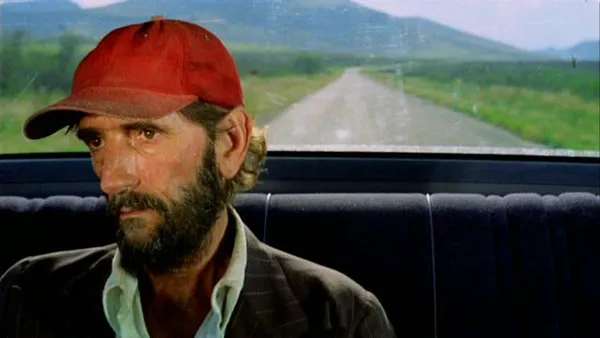Eye For Film >> Movies >> Paris, Texas (1984) Film Review
Paris, Texas
Reviewed by: Niall McCallum

There are some films that express their story with such deft skill and emotional charge that they remain with you after the credits roll, with the unmistakable feeling of having been moved lodged somewhere within your ribcage. German director Wim Wenders allows Paris, Texas to unfurl with such assured calm that each delicate narrative revelation, no matter how trivial or terrible, seems a natural and almost obvious progression.
A tale of dysfunctional America, seen through the eyes of outsiders Wenders and cinematographer Roby Müller, the film revolves around an initially amnesiac man as he is forced to put his life back together, piece by piece. The bluesy, slide-guitar score provided by Ry Cooder lends the film a knowing feel, which seems to point simultaneously to a dark past and slightly brighter future whenever it appears.

The film opens with aerial views of the Mojave desert, barren, jagged and hot. In the midst of this empty expanse appears a man, stumbling on and gaping vacantly at his surroundings, apparently clueless as to his location or destination. After coming across and collapsing in a ramshackle bar, he is identified as Travis Henderson in a green neon-lit, back-alley clinic.
Collected by brother Walt who has driven to Texas from his home in Los Angeles, we learn on the long drive back that Travis has been missing for four years, assumed dead by Walt and his wife, and that Travis' now seven-year-old son Hunter has been in their care since his disappearance. These details are revealed courtesy of Walt as Travis is mute for the first portion of the film, unwilling or perhaps unable to utter even a word to his brother. Gradually however, over the course of their journey Travis begins to find his voice, though his mind seems as blank as the landscape from which he has been rescued.
Where has Travis' memory gone? What has caused his lengthy absence from Hunter's life? These mysteries are at the core of Paris, Texas, and the film's power lies in the hypnotic teasing out of the answers from its reuniting band of characters.
In LA Travis is reacquainted with Walt's caring wife Anne and their relationship quickly blossoms with affection. Travis' quiet, boyish manner is harder for Hunter to get to grips with and he initially shows little interest in reconnecting with his father. Nevertheless, Hunter is slowly won over by Travis' charmingly childish ways and the two develop a tender, mutually understanding bond. It is from this that Travis finds the strength to face up to the terrible event that ripped his family in three, and to seek out Hunter's mother, Jane.
Taking Hunter out of school, Travis and son set out for Dallas, Texas, to Anne and Walt's great distress. A drive-through bank in the city is Travis' only clue to Jane's whereabouts and after some light reconnaissance, her distinctive blonde hair is spotted by Hunter. Following her by car then on foot, Travis discovers that Jane works in a lurid, peepshow booth. The collision of the tenderness of Travis and Hunter's rekindled relationship and the seediness of Jane's work seems jarring, until Travis begins to speak to her. Out gently pours the sordid tale of the destruction of their relationship, in an encounter that becomes truly cathartic.
Müller's beautifully composed, long takes with economic use of movement and dialogue prescribed by Wenders, gives the audience a key insight into the delicate state of Travis' reassembling mind. The long, pilgrimage-like journey they take us on, from the limbo of the unconquered desert to the towering Capitalism of wealthy Dallas, elegantly articulates Travis' recovery and bid for redemption.
Harry Dean Stanton has never been better cast as the damaged Travis and his introverted, world-weary performance is refreshing beyond comparison. More than a match for this though is Hunter Carson, who surely gives the finest performance from a child actor as the precocious, endearing Hunter, ever seen on screen. Nastassja Kinski excels as the attractive final piece of Travis' puzzle, her careful Southern drawl and cautious movements playing brilliantly off Stanton's sad, drooping stare in the penultimate scene, rendering their strange reunion simply heart-breaking.
Playwright Sam Shepard's story is deceptively simple, which is fitting considering its exposure of the sought-after easy American life as a deception itself. He shows that what is in fact easy is to feel lost in that big, impersonal continent, driving good men to hold on to what they have with bared teeth and white knuckles, rather than love and care. The film's title refers to the town that Travis believes he was conceived in, which was also the inspiration for a cruel joke his father used to play on his mother. Travis mentions the town throughout the film, "Paris" is in fact the first word spoken by him - this is Travis' way of showing he cannot forget his past, making his present splintered state irreparable.
Wenders has bathed much of Paris, Texas in neon colours, primarily green and red, giving the odd impression that much of the story is being played out in the parking lots of strip-clubs or tacky casinos. These are the places where the American dream comes crashing down on the unfortunate souls of the nation, broke, drunk and half crazy, ejected even from these slum-class establishments. For Travis, the dream has broken him along with it, reflected in the sad but hopeful closing notes of Paris, Texas. He knows at last that dreams can not come true, but mistakes at least may be mended.
Reviewed on: 11 Oct 2011
















